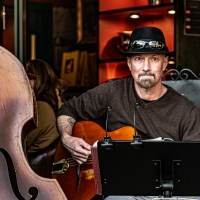DjangoBooks.com
Welcome to our Community!
Categories
- 20K All Categories
- 1.1K General
- 483 Welcome
- 59 Archtop Eddy's Corner
- 146 CD, DVD, and Concert Reviews
- 385 FAQ
- 26 Gypsy Jazz Italia
- 27 Photos
- 209 Gypsy Picking
- 21 Unaccompanied Django
- 15 Pearl Django Play-Along Vol.1
- 17 Gypsy Fire
- 45 Gypsy Rhythm
- 1.4K Gypsy Jazz University - Get Educated
- 131 Gypsy Jazz 101
- 230 Repertoire
- 226 History
- 709 Technique
- 51 Licks and Patterns
- 6 Daniel Givone Manouche Guitare Method Users Group
- 20 Eddie Lang Club
- 1.3K Gypsy Jazz Gear
- 812 Guitars, Strings, Picks, Amps, Pickups and Other Accessories
- 463 Classifieds
- 50 Recording
- 62 Other Instruments
- 18 Violin
- 5 Mandolin
- 22 Accordion
- 7 Bass
- 10 Woodwinds
- 351 Gypsy Jazz Events
- 144 North America
- 112 Europe
- 95 International
Who's Online (0)
Soloing using triads with enclosures
I recently took an online course from Yaakov Hoter on using triads with enclosures to solo over GJ tunes. For those that havent explored this, he basically teaches you to learn the major and minor triads in 3 different places on the neck, using familiar chord patterns we all learned when we first started playing guitar. In addition to employing those chord tones (the 1, 3 and 5), he teaches you to use the chromatic note below to approach the chord tone, and then use the diatonic note above the chord tone over major and minor chords, and to use the chromatic note above the chord tones over dominant 7 chords. I wonder what you all think of this technique? I've found it particularly helpful when at a jam and soloing over a tune for the first time. While i wouldnt use this exclusively, I have added it to my toolbox. I would appreciate readers' thoughts on this.












Comments
The other school of though is to learn a bunch of licks and tricks and blend them together into something.
In the end, I don't know if it matters which course you choose. If it sounds good it is good.
I think of triads as superimpositons thinking either of a diatonic superimposition, intervallic or mode.
However i just really think of this as something i see as "level of comprehension", which i fear my teachers may bash at me if i speak openly of this.
Sometimes at least on the musical education i recieved over the years, its pretty hard to be spoken about musical intentions and motives outside of a theoretical context, always talking about extensions, wether if it its it's mode o not, scales that fit the chord tones. basically sometimes i thinks it's pretty wise to just think of something more charged on intentions and specific notes you want to be either be really close to your chord or just, extremely out of it, i find classical music to have a very advanced concept of what i aim for sound in my head. you can sense the viscerality of many of the greats compositions that sometimes jazz academics i feel they lack, however all the great jazz improvisers have this quality in common, they tend to be very expressive with their improvisation! i think you should stick to what speaks better of yourself when you improvise, be it on whatevr resources you find useful.
I think when one takes a solo on an unknown tune usually you get to hear the chord progression at least one time for the head before actually having to improvise, that moment is key and really is challenging.
If you are familiarized with structures and know how it goes like, ABA, AABA, BAC, ABCA etc. it can be prety useful, specially in tunes that were pop songs adapted to jazz beause while their harmony may vary a lot between one an other , the structure doesn't so much you get to identify where the tensions are and so pretty quickly.
I know people who only need to take one listen to chord progression and are ready for it, that's what i aim for, still years left for me to practice.